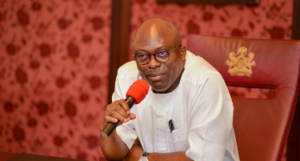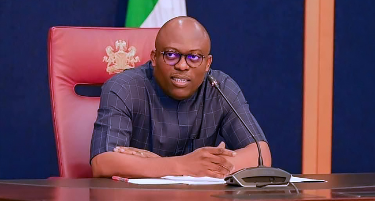June 17, 2024, might appear to be just another day for many, but in Rivers State, it carries substantial significance. This date marks the conclusion of the three-year tenure for the elected local government chairmen, as stipulated in the state’s Local Government Law. However, what should have been a straightforward transition has become a flashpoint for political upheaval, largely due to the intensifying feud between Governor Siminalayi Fubara and his predecessor, Nyesom Wike, who now serves as the Minister of the Federal Capital Territory.
The conflict reached a critical point following a fire that broke out in the Rivers State House of Assembly on October 30, leading to a sharp division within the Assembly. This division saw 27 members rallying behind Speaker Martin Amaewhule, while four members aligned with the House Leader, Edison Ehie, who served as the Deputy Speaker in the previous Assembly. Subsequently, Ehie was replaced by Victor Oko-Jumbo, adding another layer of complexity to the already fraught situation.
Amidst this turmoil, Amaewhule’s Assembly made an attempt to amend the Local Government Law, aiming to extend the tenure of elected chairmen and councilors by six months if elections were not held before the end of their terms. However, this amendment was short-lived as it was nullified by a High Court judgment following a lawsuit filed by the council chairmen of Opobo/Nkoro and Bonny. The chairmen loyal to Wike faced further setbacks when a State High Court restrained Amaewhule’s group from acting as lawmakers and nullified their legislative actions.
The situation escalated further with a recent Appeal Court ruling, which upheld the lower court’s decision to restrain Amaewhule and his colleagues. This ruling was seen as a decisive blow to Amaewhule’s faction, but it only served to heighten the tension. On the same day the Appeal Court issued its decision, Amaewhule and his 24 colleagues held a press conference, asserting that the Assembly, specifically referring to themselves, would not accept any list of caretaker committee members.
Governor Siminalayi Fubara, addressing the council chairmen at a recent function, reminded them that their days in office were numbered. This statement has left political observers in anticipation, expecting the governor to make a crucial decision regarding the leadership of the 23 local government areas.

The unfolding drama has cast a shadow over Rivers State’s political landscape. The conflict between Fubara and Wike is not just a personal vendetta but has deep implications for the governance and stability of the state. As the tenure of the local government chairmen ends, the political community and the public alike are keenly watching how the governor will navigate this turbulent period.
Political analysts are particularly interested in whether Fubara will appoint caretaker committees or push for immediate elections to resolve the leadership vacuum. The outcome of this decision could significantly impact the political dynamics in Rivers State, either calming the current unrest or potentially igniting further disputes.
As the situation continues to develop, it is clear that the events of June 17 will be remembered as a significant moment in Rivers State’s political history. The resolution of this conflict will not only determine the immediate future of local governance but also set the tone for the ongoing power struggle between the current governor and his influential predecessor. The coming days will be critical in shaping the path forward for Rivers State, and all eyes are on Governor Fubara as he makes his next move.




